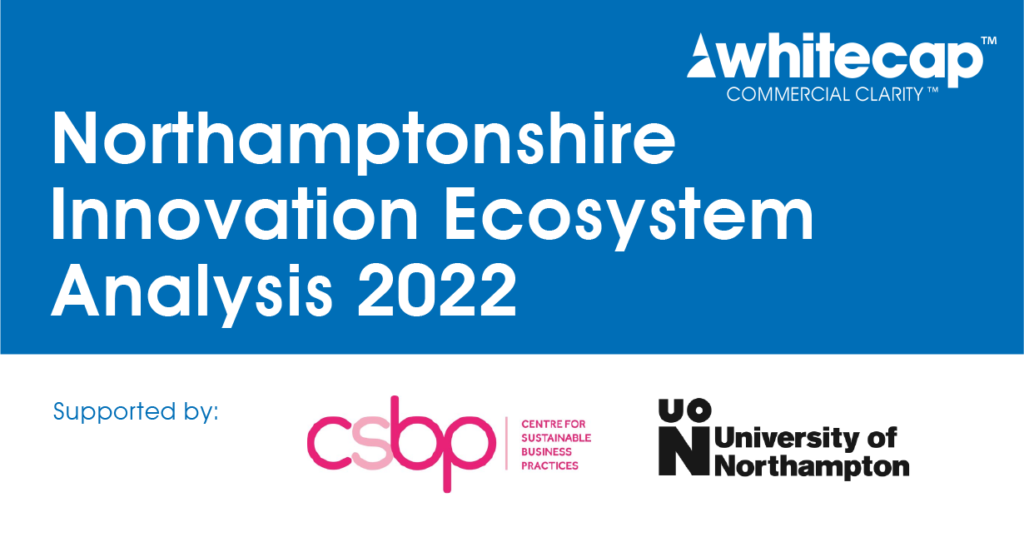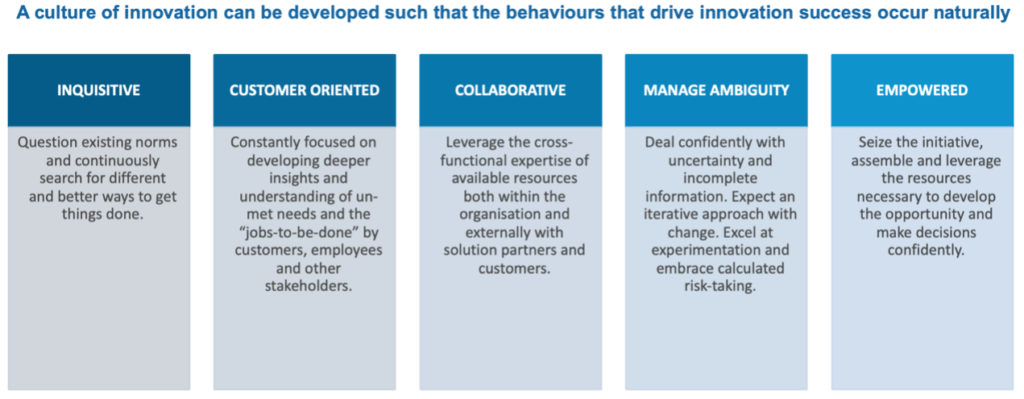 Collaboration: a sense that the outcomes being sought would be “greater than the sum of its part” – i.e., the outcomes are more likely to be better than we would expect from individual parts, because the way they combine adds a different level of quality.
Collaboration: a sense that the outcomes being sought would be “greater than the sum of its part” – i.e., the outcomes are more likely to be better than we would expect from individual parts, because the way they combine adds a different level of quality.
We are actively looking to collaborate with people across the business community, public sector and third sector organisations on a study to identify how the innovation capacity within the County of Northamptonshire can be further developed. Our objective is to identify the critical resources, capabilities and culture needed to increase economic activity and growth opportunities between and within organisations – and ultimately to create opportunities for people who live and work in the county.
Our call to action was prompted by research indicating that although Northamptonshire has one of the strongest rates of business start-up in the UK, the county was also identified as one of nine “cold spots” for scale-ups in England. We want to find-out why businesses have so much difficulty transitioning from the start-up phase towards fulfilling their ambitions to scale their operations. What are the practical steps that can be taken by us individually and by our organisations to increase the level of collaboration in the county? We think that a culture of innovation is an important lens for understanding and identifying the practical interventions – such as funding sources, infrastructure, talent, and other resources that in combination can spark a paradigm shift in the outlook for ambitious entrepreneurs who are looking to grow their businesses at scale within Northamptonshire.
Defining Innovation and Culture of Innovation
Innovation is a word that is used in so many different contexts to mean so many different things. So, it is probably a good idea to provide a common definition and understanding for what we mean by “innovation” and the “culture of innovation”.
We start with a simple definition of innovation as delivering “something different that has impact”. It is different to the innovation target (e.g., clients, customers, employees, and society in general), and has impact in terms of a measurable result such as return on investment (ROI)/profit; improved performance of a process; and having a measurable effect on someone’s life. Innovation is not purely the domain of engineers and scientists, nor is it limited to developing new products. The ways of doing things (processes) and marketing approaches can also be innovative. It could be a breakthrough solution or an incremental improvement that simplifies the complicated or makes the expensive more affordable.
Several research studies on innovation practices and observations through our work, indicate that the most innovative businesses exhibit five critical behaviours with collaboration being central to a culture of innovation:

In combination, these behaviours form the culture of innovation that organisations must develop and nurture to drive innovation success. Individually, none of these behaviours are surprising, but it is inexplicable that combinations of these five behaviours are less common. As children, most of us were inquisitive, creative, collaborative, and risk taking – but as we progressed through school and subsequently entered the workplace, many of these behaviours become suppressed. Our “innovation muscles” become weakened as we learn and conform to organisational norms/rules, existing processes, operating metrics, decision criteria and performance incentives.
Northamptonshire Innovation Ecosystem Analysis
Bringing this to life, at a webinar hosted by the University of Northampton and Whitecap in 2021 – we surveyed registrants asking them to describe the barriers to innovation in their organisations. Their responses predominantly pointed to a lack of time. They also indicated a lack of capacity; a lack of innovation skills/training; and a lack of infrastructure to support bringing ideas to life. Overall, organisation inertia (the ability to make internal cultural changes in the face of significant external changes) is one of the greatest impediments to successful innovation. Collaboration was also the most frequently mentioned word that registrants felt was most needed in the county to facilitate more innovation.
And in January 2022, the Lord-Lieutenant’s Business Beacon’s meeting also hosted by the University of Northampton, discussed the need and desire for greater cross sector collaboration to support in Northamptonshire’s growth.
Our Northamptonshire Innovation Ecosystem Analysis will involve an audit of the innovation capabilities of local organisations, across key sectors (including innovation and high-performance technology; manufacturing and advanced technology; logistics and supply chain; food and drink; and creative and cultural) in the county – to find-out:
- How well is collaboration working between (and within) firms in the county?
- What aspects of innovation and culture of innovation is working well?
- What are “the gaps” and how can they be bridged? – i.e., to identify the areas that can be developed or strengthened.
- What are the specific talent and expertise shortages in Northamptonshire?
- What funding sources are available and what investment is required?
We will highlight best practices observed within Northamptonshire and conduct a benchmarking exercise against another UK region/or city.
A freely available report will be produced that will set out details of our exploration and analysis of Northamptonshire’s innovation capabilities and resources. It will include the key learning outcomes about the gaps identified in terms of capabilities and resources needed in Northamptonshire. We will include practical recommendations for individuals and businesses in the county on how we can all increase our collaboration efforts.
You can learn more about the ecosystem analysis Northamptonshire Innovation Proposal Document_January 2022 and we hope you can support this initiative. If you’d like to find out more about sponsoring the ecosystem analysis, or if you would like to discuss any of the points raised, please do not hesitate to contact us.
If you’d like to discuss this blog post or share your own perspective on the issues covered, please get in touch or comment via our social media channels on LinkedIn or Twitter.
Established in 2012, Whitecap Consulting is a regional strategy consultancy headquartered in Leeds, with offices in Manchester, Milton Keynes, Birmingham, Bristol and Newcastle. We typically work with boards, executives and investors of predominantly mid-sized organisations with a turnover of c£10m-£300m, helping clients analyse, develop and implement growth strategies. Also, we work with clients across a range of sectors including Financial Services, Technology, FinTech, Outsourcing, Consumer and Retail, Property, Healthcare, Higher Education, Manufacturing and Professional Services, including Corporate Finance and PE.